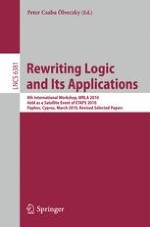2010 | Buch
Rewriting Logic and Its Applications
8th International Workshop, WRLA 2010, Held as a Satellite Event of ETAPS 2010, Paphos, Cyprus, March 20-21, 2010, Revised Selected Papers
herausgegeben von: Peter Csaba Ölveczky
Verlag: Springer Berlin Heidelberg
Buchreihe : Lecture Notes in Computer Science
